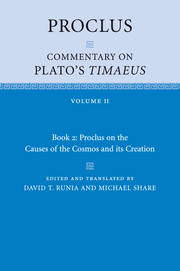I - The Constitution of the Cosmos: 355.16–416.5
Published online by Cambridge University Press: 30 June 2022
Summary
Introduction of the final cause, the Good
Let us, then, state on account of what cause he who constructed generation and this universe constructed them (29d7–e1)
Recapitulation of the preliminaries to the creation: 355.18–28
Everything said so far has been providing us with preliminaries to the science of nature in its entirety. Some of it has presented the doctrine of the cosmos by means of images and symbols, while some has put in place preludes5 to the entire dissertation. Of the presentation by means of images or symbols, one part showed the unity of things in the cosmos, another their separateness, and of the preludes, some were basic principles (hupotheseis), others were like propositions (lêmmata) demonstrated by means of these basic principles, since one could even count what is said about the nature of the discourse among the things so demonstrated, because [it is] from its having been proved that the cosmos is generated [that] it follows that the dissertation on the cosmos is [only] likely discourse.
General explanation: 355.28–357.12
But once these matters have received a fitting conclusion and Timaeus begins on the creation of the universe, he makes a beginning with the Good, believing that his best point of departure is the discovery of the final cause. For, just as the Good is the cause of everything that exists, so too does the generation of the cosmos proceed from this the most primary of principles. Because all things are from the Good: things for which demiurgic intellect is not responsible, for example matter, have the Good as their cause, and things for whose existence the Paradigm is not responsible also derive their existence from that source (ekeithen). ‘All things exist on account of it, and it is the cause of all beautiful things’, as is said in the Letters (312e2–3). For this reason Timaeus refers the other causes to this, the one cause. For, having discovered the form of the cosmos, and its paradigmatic cause and its efficient cause, by way of the basic principles (hupotheseis), he will now wish to give the most sovereign and venerable of causes, the final [cause], which one should be especially desirous of [discovering] in the case of the universal creation.
- Type
- Chapter
- Information
- Proclus: Commentary on Plato's Timaeus Volume 2: Book 2: Proclus on the Causes of the Cosmos and its Creation , pp. 214 - 297Publisher: Cambridge University PressPrint publication year: 2008



